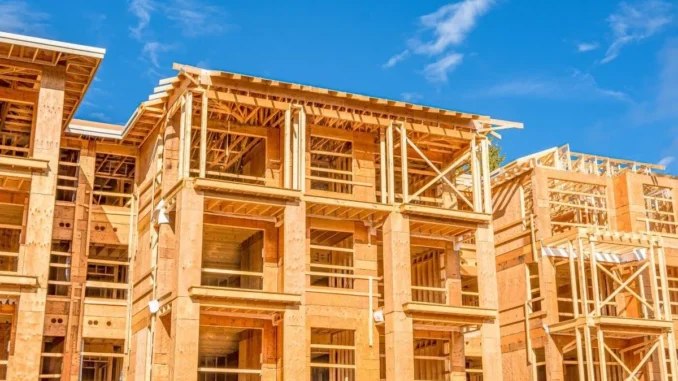
New construction of residential homes receded in March, and multifamily housing starts also declined. Homebuilder confidence also dwindled in April due to elevated mortgage rates, coupled with a stronger-than-expected inflation reading.
Privately owned housing starts fell to a seasonally adjusted annual rate of 1.321 million units, down 14.7% month over month and down 4.3% year over year, according to a report released Tuesday by the U.S. Census Bureau and the U.S. Department of Housing and Urban Development (HUD).
Single‐family housing starts in March fell 12.4% to a rate of 1.022 million units, while multifamily starts ticked down to 290,000 units. Starts of new single-family homes are up 21.2% compared to a year ago; however, multifamily housing starts are down sharply.
“Inventory has been a major constraint on the housing market, and new construction has been an outsized share of the market,” Bright MLS chief economist, Lisa Sturtevant, said in a statement. “With homebuilding activity still strong, buyers are now also seeing more listings of existing homes coming onto the market. While overall inventory is still low by historical standards, this spring and summer should offer buyers more options. Builders who may have held back on incentives or price cuts might be looking for ways to entice homebuyers who are shopping [for] existing homes.”
In April, 22% of builders cut prices, down from 24% in March and 36% in December 2023. But the average price reduction in April held steady at 6% for the 10th straight month. Meanwhile, the use of sales incentives fell to 57% in April, down from a share of 60% in March.
“The March housing starts data signals a loss of momentum for single-family construction, but perspective is important – single-family groundbreaking is still up 21% compared with a year ago and is more than 20% above the five-year pre-pandemic average,” said Odeta Kushi, deputy chief economist at First American.
The rate at which building permits were issued in March also dropped. It fell by 4.3% month over month to a seasonally adjusted annual rate of 1.458 million. It was still up by 1.5% from the same time last year. Notably, the number of single-family authorizations was down 5.7% month over month in March to a rate of 973,000 units. Meanwhile, multifamily authorizations decreased to a rate of 433,000 units.
Housing completions also dropped in March compared to February, falling 13.5% to 1.469 million units. Single‐family completions fell by 10.5% between February and March, to a rate of 947,000. Meanwhile, multifamily completions came in at a rate of 502,000 in March.
“Housing starts surged in the West in March, posting strong gains after an anemic 2023,” Sturtevant said. “This increase in new construction in the western region is a good sign for home shoppers there who have faced high prices and limited inventory.”
Despite the challenges, the new-home market will likely continue to outperform the existing-home market over the near term, said Kushi, for one simple reason. “Unlike existing homeowners, builders are not rate locked-in.”



